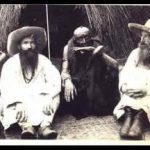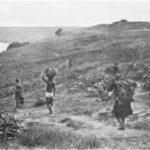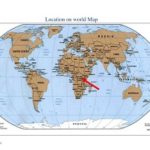Power Struggles at the Court: Kabare and Ruhinankiko
Since the arrival of the Europeans, the Court, aware of its own limitations, had dealt skillfully with the problems and advantages created by the presence of the powerful strangers. Unable to ban the Fathers, it had restricted their impact by relegating them to Save and by isolating them from the Tutsi. Playing on the missionaries’ desire for good relations, it had cut them off from Cyitatire, the one Tutsi in the area who constituted a threat, and had won from them a declaration that they were the “whites of Yuhi, not of Kyitatire.” Concerned by the unrest in Gisaka, the Court reached an accommodation with the Fathers over the Njangwe case; when this proved insufficient to guarantee the support of the missionaries in Gisaka, the Court engineered an impressive movement to the church in the Save area while proving more hospitable to the Fathers at Nyanza. The result was that the Court found greater support from the Fathers, and German intervention had soon repressed the Gisaka uprising, expelled the troublesome trader Spears, and punished the Court’s enemy Cyoya all to the benefit of the mwami. The Court then exercised its control over the new adherents of the Save mission, forcing many of them to withdraw from their association with the Fathers, while at the same time it wooed the Zaza Fathers, who occupied a crucial position in the still delicate Gisaka situation. When the Fathers at Zaza switched their support to local Gisaka notables, the Court spent several months maneuvering to win them back, working through their colleagues at Save. When all else failed and the test of strength drew in the Germans, the Court won their support against both the Fathers and the people of Gisaka.
But then the Court, seriously misjudging the extent of German support, executed Mpumbika’s followers and brought upon itself punishment by the Germans. Although it had previously yielded to European demands (as in the Njangwe case), and had curried favor with the foreigners to secure their aid (as in the Gisaka uprising), the Court had never before been obliged to recognize the full implications of the submission that it had made to the Germans in accepting the protectorate. While the Shangi battle had shown that the mwami lacked the force to exclude foreigners from his country; the Mpumbika affair demonstrated that he no longer had the power to administer the kingdom with the autonomy he might wish. The Court was forced to accept that there was now a superior authority that might not intervene often in internal affairs, but that couldintervene when it willed to do so.
Kanjogera, still the controlling force at Court, held Ruhinankiko responsible for the crucial misstep that had led to the German assertion of authority. She began to be swayed by those who argued that Ruhinankiko’s policy of accommodation with the Europeans was too costly for the benefits it procured. As Ruhinankiko’s policy came under attack, his opponents massed for a challenge to his leadership. Although he had displaced his brother Kabare as Kanjogera’s chief adviser and had had him relegated to Bugesera, Ruhinankiko had never been able to destroy Kabare’s power completely. Among the royal entourage, there were still many who preferred Kabare, who was apparently the more affable of the two. Their ranks were swelled by all those who sought revenge for the killings and pillage engineered by Ruhinankiko in 1899 and 1900, or who hoped to profit from the reassignment of domains that would inevitably follow from the replacement of one favorite by another. Ruhinankiko was accused of cutting the Court off from the people and of exploiting the wealth of the country for his personal profit or that of his clients.
In February or March 1903 Kanjogera recalled Kabare from Bugesera. By April the confrontation between the two brothers was clear. For nearly two years, members of the two factions, evenly matched in strength, struggled openly at Court, insulting and accusing each other almost daily. Tension was so high that no notable came to Court unarmed. From the time that Kanjogera recalled Kabare, she seemed to be leaning to his side, but she was reluctant to commit herself too definitively to one or the other. Musinga, on the other hand, clearly favored Ruhinankiko. He may well have realized that if he were ever to assume effective leadership, he would need strong allies in wresting control from his mother and her family. Ruhinankiko, who had been cast in the role of protector of the Banyiginya ever since he tried to save Musinga’s brothers Baryinyonza and Burabyo from execution by Kanjogera and Kabare in 1897, was more likely to fill that role than Kabare, who seemed tied to the interests of the Bega.
Standing with Musinga and Ruhinankiko were two leaders of the Banyiginya: Sebuharara, an extremely personable mutware, and his cousin, Cyaka. Musinga’s great affection for Sebuharara made it difficult for Kabare to dispose of him. Many of the Court feared that if they acted against the mwami’s favorite during these years when he was just becoming aware of his own power, they might stand to suffer once he gained full control of the kingdom. Musinga’s hand, and thus that of Ruhinankiko, was strengthened by the presence at Court of the Indenga-baginizi, the regiment that was then in training as nucleus for a new army. Because Musinga himself was a member of this regiment, the young men who belonged to it felt a special loyalty to him. Openly rejecting the authority of their leader Ruhararamanzi, who belonged to Kabare’s faction, they swore that they would assassinate Kabare himself if he ever harmed one of their number. Musinga also promised that if any one of them were killed, he would avenge him as soon as he took effective command of the kingdom. Kabare, however, skillfully eliminated the threat posed by these young men by gradually dispersing the members of the regiment back to their home regions.
In October and again in November 1903, Kabare’s men and Ruhinankiko’s men engaged in small battles in Gisaka, but intervention by the Zaza Fathers kept the fights from becoming serious. By January 1904 Kabare was powerful enough to send Sebuharara and Cyaka away from Court, depriving them of most of their domains.Afraid for their eventual safety or anxious to secure what possessions remained to them, the two tried to flee north to Ndorwa, accompanied by many of the young members of Sebuharara’s regiment, the Abashamba. They were met by troops of the Court at a hill called Rwata, where the two leaders and hundreds of their men lost their lives after inflicting heavy losses on the Court warriors(Apparently, some of the group had escaped the day before and sought help from a German officer who was camped about twenty-five miles away, but he arrived too late to save Sebuharara and Cyaka, who had burned themselves to death in a house when they saw their cause was lost (Kagame, Les milices, 124, 136-37).
By eliminating Sebuharara and Cyaka, Kabare had greatly weakened Ruhinankiko. Ruhinankiko’s cause suffered further in September 1904 when leaders of the Abarasa regiment who had been implicated in the Gisaka uprising and who were still in exile in Burundi sent word to the Court that they would like to return to Rwanda but feared Ruhinankiko’s vengeance. This message reminded Kanjogera of Ruhinankiko’s failures in Gisaka and at the same time tempted her with the return of important men who would support the Court – once Ruhinankiko were removed from it. Still Kabare hesitated, seeking stronger backing for his final move. In November 1904 he reputedly asked von Grawert, who was then at Nyanza, to allow him to kill Ruhinankiko and several of his supporters “who wanted to rule in place of the king.” Von Grawert supposedly refused, suggesting that he merely deprive them of their commands instead. Finally, in January 1905 Kabare emerged victorious: Ruhinankiko lost all but a single hill of his domains and was ordered not to appear again in the inner enclosure reserved for the elite at Court. Kabare replaced all of the leaders of Ruhinankiko’s faction with men from his own following. But, perhaps because of von Grawert’s refusal to sanction Ruhinankiko’s execution, Kabare refrained from the killings that had usually followed such a shift in political fortunes. In fact, his elimination of Cyaka and Sebuharara and their men in April 1904 had marked the end of the bloody era that began with the coup at Rucunshu in 1897.
https://uk.amateka.net/power-struggles-at-the-court-kabare-and-ruhinankiko/https://uk.amateka.net/wp-content/uploads/2022/11/yuhi-musinga.jpghttps://uk.amateka.net/wp-content/uploads/2022/11/yuhi-musinga-150x150.jpgModel CitizenshipSince the arrival of the Europeans, the Court, aware of its own limitations, had dealt skillfully with the problems and advantages created by the presence of the powerful strangers. Unable to ban the Fathers, it had restricted their impact by relegating them to Save and by isolating them from...BarataBarata rpierre@ikaze.netAdministratorAMATEKA | HISTORY OF RWANDA




